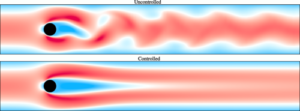This work presents a methodology for analysis and control of nonlinear fluid systems using neural networks. The approach is demonstrated in four different study cases: the Lorenz system, a modified version of the Kuramoto-Sivashinsky equation, a streamwise-periodic two-dimensional channel flow, and a confined cylinder flow. Neural networks are trained as models to capture the complex system dynamics and estimate equilibrium points through a Newton method, enabled by back-propagation. These neural network surrogate models (NNSMs) are leveraged to train a second neural network, which is designed to act as a stabilizing closed-loop controller. The training process employs a recurrent approach, whereby the NNSM and the neural network controller are chained in closed loop along a finite time horizon. By cycling through phases of combined random open-loop actuation and closed-loop control, an iterative training process is introduced to overcome the lack of data near equilibrium points. This approach improves the accuracy of the models in the most critical region for achieving stabilization. Through the use of L1 regularization within loss functions, the NNSMs can also guide optimal sensor placement, reducing the number of sensors from an initial candidate set. The data sets produced during the iterative training process are also leveraged for conducting a linear stability analysis through a modified dynamic mode decomposition approach. The results demonstrate the effectiveness of computationally inexpensive neural networks in modeling, controlling, and enabling stability analysis of nonlinear systems, providing insights into the system behavior and offering potential for stabilization of complex fluid systems.

Neural networks in feedback for flow analysis and control TC Déda, WR Wolf, STM Dawson Physical Review Fluids 9 (6), 063904

